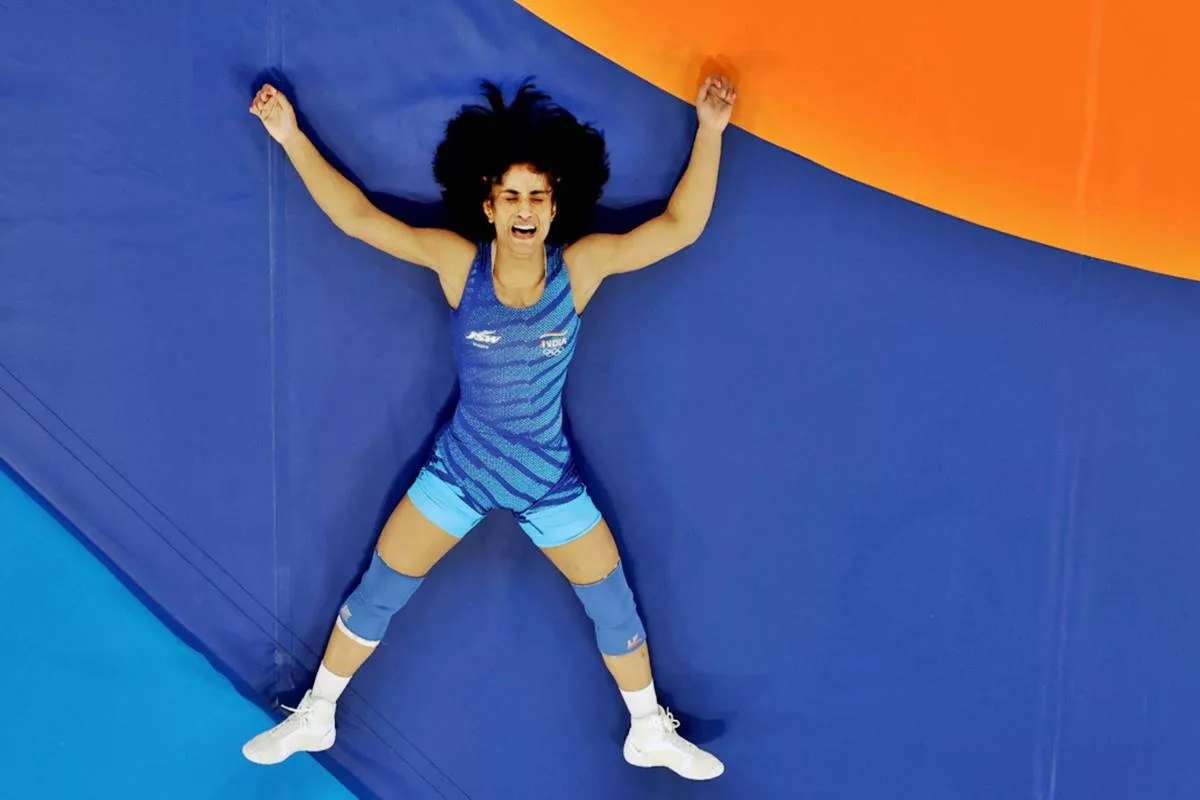
A Grave Injustice: The Unjust Disqualification of Vinesh Phogat from the Paris Olympics
India’s ace grappler, Vinesh Phogat, stood on the cusp of ultimate glory at the Paris Olympic Games but now faces a heartbreaking disqualification. Competing in the 50kg freestyle wrestling category, Vinesh has reportedly been disqualified for being slightly over the weight limit for her event. This decision, made on the basis of a mere 100 grams, is not just a technicality but a devastating blow to an athlete who has worked tirelessly and overcome numerous obstacles to reach this point. The decision raises serious questions about the fairness and humanity of the Olympic rules and the potential political undertones that may have influenced this outcome.
The Harsh Reality of Strict Weight Regulations
Vinesh Phogat, who usually competes in the 53kg category, reduced her weight to compete in the 50kg category at the Paris Olympics. Despite her efforts to meet the weight requirements, including skipping meals, running, and enduring sleepless nights, she was found to be just 100 grams over the limit during the Day 2 weigh-in. The strictness of the regulations, which do not allow any exceptions, regardless of how small the excess weight may be, seems excessively rigid and lacking in empathy for the athletes.
The Olympic Games are meant to celebrate human potential and the spirit of sportsmanship. However, disqualifying an athlete for being a fraction of a kilogram over the weight limit undermines these values. The rules, while necessary to maintain fairness, should also consider the human element and the context of each situation. Vinesh’s case highlights the need for a more flexible and compassionate approach to regulations.
A Journey Marked by Resilience and Determination
Vinesh Phogat’s journey to the Paris Olympics has been nothing short of remarkable. Overcoming significant challenges, she scripted history by becoming the first Indian woman to reach the final of a wrestling event in the Olympic Games. Her victories against top-tier opponents, including the reigning world champion Yui Susaki of Japan, Ukraine’s Oksana Livach, and Cuba’s Yusneylis Guzman Lopez, showcased her skill, resilience, and mental fortitude.
Her journey is a testament to her indomitable spirit. Despite facing adversity, she continued to fight and achieve milestones that few believed possible. The disqualification, therefore, is not just a technical ruling but a gross injustice to an athlete who has given her all to represent her country and her sport at the highest level.
The Broader Implications of the Disqualification
The implications of Vinesh’s disqualification go beyond her personal disappointment. It reflects a system that is rigid to the point of being unreasonable. The Olympic Committee’s refusal to allow a minor leeway or additional time for her to meet the weight requirement indicates a lack of consideration for the athletes’ well-being. Athletes are human beings who endure immense physical and mental strain. The inability to account for such minor deviations suggests an outdated and draconian approach to sports regulation.
Moreover, this decision sets a concerning precedent. It sends a message that the system values strict adherence to rules over the efforts and sacrifices of the athletes. This could discourage many from pursuing sports at the highest levels, knowing that their dreams could be shattered by such rigid and unforgiving regulations.
Questioning the Involvement of Political Factors
Adding a layer of complexity to this issue is the backdrop of Vinesh Phogat’s protest against Brij Bhushan Sharan Singh, the former president of the Wrestling Federation of India (WFI), over sexual harassment allegations. The protest, which took place at Jantar Mantar in 2023, was a significant moment for Indian sports, highlighting the need for justice and dignity in athletics.
The muted response from the government to these allegations and the subsequent backlash faced by the athletes suggest a hostile environment for those who dare to speak out. Vinesh’s success at the Olympics could have been seen as a victory for those fighting against such injustices. The timing of her disqualification raises suspicions about whether there were ulterior motives at play, especially considering the government’s tarnished image in handling the harassment case.
The Role of the Modi Government
The Modi government has faced criticism for its treatment of Vinesh and other athletes involved in the protest against Brij Bhushan Sharan Singh. The disqualification, coinciding with the government’s image concerns, leads to speculation about possible political interference. Could it be that the government did not want Vinesh to win a medal and further highlight its failures in addressing the harassment allegations?
This suspicion is fueled by the numerous articles and social media posts criticizing the Modi government’s handling of the situation. The disqualification, therefore, might not be a mere coincidence but a calculated move to prevent further embarrassment. The Olympic Committee’s decision, possibly influenced by political factors, undermines the integrity of the Games and the spirit of fair competition.
The Need for Reform
The disqualification of Vinesh Phogat underscores the urgent need for reform in the Olympic regulations. The rules should be designed to ensure fairness while also accommodating the realities faced by athletes. A more flexible and humane approach is necessary, one that considers the context and allows for minor deviations that do not provide any competitive advantage.
Furthermore, there should be mechanisms to protect athletes from potential political interference. The integrity of the Games must be preserved, ensuring that all decisions are made purely based on athletic performance and merit. The involvement of political factors tarnishes the spirit of the Olympics and erodes trust in the system.
The disqualification of Vinesh Phogat from the Paris Olympics is a stark reminder of the flaws in the current system. It highlights the need for a more empathetic and flexible approach to regulations and raises serious concerns about potential political interference in sports. Vinesh’s journey, marked by resilience and determination, deserves to be celebrated, not undermined by rigid rules and questionable motives.
As we reflect on this unfortunate incident, it is crucial to advocate for changes that ensure fairness, justice, and respect for athletes. The Olympic Games should stand as a beacon of hope and inspiration, celebrating the best of human potential. To achieve this, we must address the issues highlighted by Vinesh’s disqualification and work towards a system that truly values and supports its athletes.
Sources :
https://sports.ndtv.com/olympics-2024/indian-wrestler-vinesh-phogat-disqualified-from-paris-olympics-medal-heartbreak-6282216
https://www.thehindu.com/sport/olympics/vinesh-phogat-disqualified-from-competing-on-second-day-of-paris-olympic-misses-historic-medal/article68495726.ece
https://timesofindia.indiatimes.com/sports/paris-olympics-2024/paris-olympics-2024-day-12-live-updates-india-schedule-athletes-medal-tally-wrestling-table-tennis-weightlifting-mirabai-chanu-vinesh-phogat-manika-batra/liveblog/112333733.cms
https://indianexpress.com/article/sports/sport-others/vinesh-phogat-likely-to-be-disqualified-to-miss-paris-olympic-medal-9499953/








